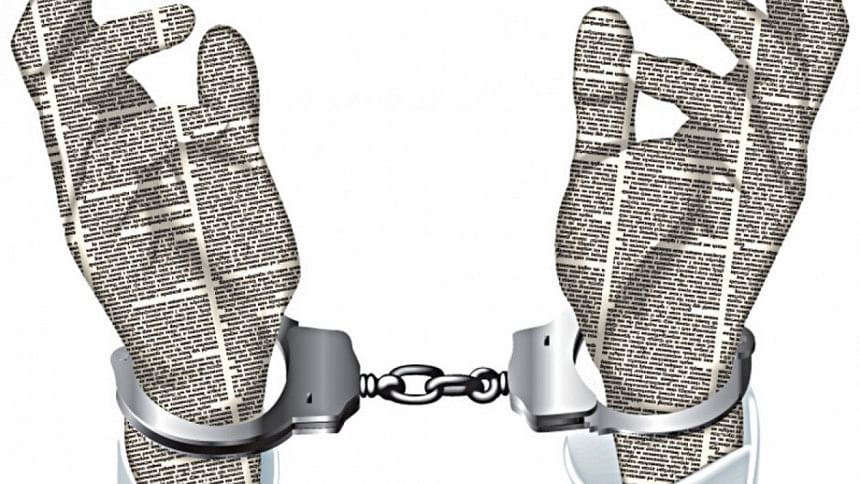ICT Act, Digital Security Act and press freedom

Article 39 of the Bangladesh Constitution impliedly prevents any bar on a person's freedom to write. Although at first glance it may seem journalists or writers have all the liberty, but in real life, they are encircled by restraints. The media has been subject to constant checks since even before the independence of Bangladesh, when four newspapers including the Daily Ittefaq were penalised for criticising the government. Today, with the introduction of laws seen never before, the circle of limitations keeps on closing in.
As we stepped in the digital age, the definition of press and journalists has been extended. The media is now in everyone's hands, making each person a citizen journalist. Freedom of the press may now seem vast in the online world. But historically, the press has always been under direct scrutiny of the different governments in Bangladesh. The laws that impose control over them may now be also applicable on "social media activists" acting as citizen journalists.
Journalists are usually held for the slightest hint against the administration. The most common charges are defamation and sedition. And even if they are not targeted towards the government, another principle further restricts them. Despite constitutional guarantees, press freedom may be suppressed by "contempt of court".
According to Black's Law Dictionary, contempt of court is the act of demeaning the court, preventing administration of justice, or disobeying a sentence of the court. It is criminal and can lead to fines or imprisonment.
A person may be found guilty of contempt of court if his actions intervene with the administration of justice. The law, which used to be governed by The Contempt of Court Act of 1926, may be violated if a publication of article, report or broadcast is likely to cause interference with ongoing proceedings. Contempt of court is a major concern all over the world due to its implications for press freedom.
In the UK, there needs to be a real risk of public confidence to be undermined due to the publication, to satisfy the requirement of contempt of court. The US Supreme Court has made it clear, in a series of cases, that the publication must create a "clear and present danger" to the administration of justice [Bridges v California, 314US 252]. In the Indian case of Duda PN v Shivshankar, P, it was held that criticism of the judicial system should be welcomed so long it does not impair administration of justice.
In Bangladesh, the 1926 Act had been replaced by a new one in 2013. The new Act is relatively lenient as section 4(1) declares that no publication is contempt if it is done in good faith. But apart from all these, the court still has an inherent power to punish anyone whom it finds to have interfered with court proceedings.
Now that the strict laws of contempt of court have been relaxed a little, journalists are concerned over the application of a new law. Section 57 of the Information and Communication Technology Act 2006, according to experts, directly undermines freedom of the press. The section imposes a penalty of a minimum of seven years and a maximum of 14 years of imprisonment and a maximum fine of Tk 1 crore on someone found in violation of it. An accepted translation of Section 57(1) of ICT Act 2006 has been given below:
"If any person deliberately publishes or transmits or causes to be published or transmitted in the website or in any other electronic form any material which is false and obscene and if anyone sees, hears or reads it having regard to all relevant circumstances, its effect is such as to influence the reader to become dishonest or corrupt, or causes to deteriorate or creates possibility to deteriorate law and order, prejudice the image of the state or person or causes to hurt or may hurt religious belief or instigate against any person or organisation, then this activity will be regarded as an offence" ("Free Speech vs Section 57", The Daily Star).
Therefore, a person updating a status on social media, writing a blog or running a news portal is also under the ambit of the section. Section 57 allows a third party to file a case against a person in violation of it. Hence anyone may file a case if they feel like the article on the paper or a Facebook status has even a remote possibility of deteriorating someone else's image. Hence, in front of it, press freedom becomes vulnerable.
And while now, there is talk of removing the section from the ICT Act, the draft Digital Security Act contains a very similar provision. Experts have pointed out repeatedly how removing Section 57 would be useless, if the same threats to press freedom are reintroduced through another law which too disproportionately penalises similar "offences."
Journalists in all forms are now stuck between a rock and a hard place. When one law shows them their rights, the other takes it away. The challenges posed by the laws curb not only freedom of the press but also citizens' liberty to express their opinions. While international instruments like the ICCPR or the ECHR emphasise the freedom of expression, journalists in Bangladesh still struggle to identify the line between independence and possibility of an offence.
Aiman R Khan is an apprentice advocate at Dhaka Judge Court.





Comments